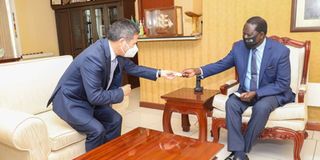China calls for ‘favourable’ media narrative on Africa ties

Former Prime Minister Raila Odinga and Chinese Ambassador to Kenya Zhou Pingjian when the envoy paid the ODM party leader a courtesy call at his office in Capitol Hill, Nairobi on November 10, 2020.
What you need to know:
- The Chinese now have the largest bureau for the China Global Television Network (CGTN) in Nairobi.
- The Chinese said they will be ready to help train African journalists on new technologies.
Chinese officials say a “favourable” narrative on their relations with Africa could come out upon urgent adoption of new media technologies, mostly being developed by Beijing.
The rallying call emerged from a forum on China-Africa Media Cooperation this week in Nairobi.
Chinese officials told an audience that Africa’s lagging in technology has sort of contributed to reliance on Western media whose telling of the goings-on in Africa has often been a smear campaign.
Dr Zhou Pingjian, China’s Ambassador to Kenya, said there will be “plenty of potential” for African tech enthusiasts and media operators in the Fourth Industrial Revolution that, he argued, could level the playing field in future.
“China has a population of 1.4 billion and a middle-income group of 400 million. Demand on the massive domestic market in China will continue to unleash endless potential for the whole world. African countries will benefit greatly from China’s new development,” Zhou said in a virtual speech at a forum at Nairobi’s Serena Hotel.
“A friendly narrative is without doubt part and parcel of a favourable environment for investment. We hope that the media could play an even more significant role in fostering an enabling environment for African industrialisation and China-Africa cooperation.”
Zhou argued that African media’s ''early adoption'' of new technology could correct the false narrative. China is currently battling with the West on 5G technology roll-out.
Non-state engagements
The US has been especially vocal against Beijing, arguing that there have been no safety and security guarantees on the technology developed by China.
The Forum, organised by the Media Council of Kenya and the Chinese Embassy in Nairobi, was part of a number of events to mark the 20th anniversary of the Forum on China-Africa
Cooperation (FOCAC), a three-yearly summit of leaders from both sides, to discuss economic and other ties.
In the last Summit in Beijing in 2018, China pledged $60 billion to go towards developing Africa, including a $15bn for innovation grants.
However, Beijing has often been accused of lacking transparency, making it difficult to determine the extent of usefulness of the money.
At the Forum, Mr Churchill Otieno, the President of Kenya Editors Guild, said Africa and China could elevate their media operations by sharing content to plug the holes on untold stories.
But he did argue that such cooperation should focus on “partnerships that drive accountability, anything else is public relations and advertising.”
“I propose that in the contest for truth, journalists and news media must rise up the value chain and be paragons of verified information,” he told the audience.
“Our best effort must be invested in fact checking and delivery of reliable information to our populations in the time and format that fit their interests.”
Chinese officials have lately been focusing on non-state engagements, perhaps departing from the usual government-to-government. A fortnight ago, they had hosted a meeting in Beijing of African and Chinese think-tanks, arguing the continent had better generate own policy data for use.
For the media, the Chinese now have the largest bureau for the China Global Television Network (CGTN) in Nairobi, part of Beijing’s long-term goal of establishing networks through the Belt and Road Initiative.
Mr Tian Yuhong, the Executive Secretary, All China Journalists Association, argued that both China and Africa have been victims of a smear campaign by the West and should work together to fight back.
“The Chinese and African press should strengthen exchanges and cooperation, learn from each other, and jointly promote the development of media convergence,” he said in a virtual speech from Beijing.”
Scientific media coverage
“For quite some time, the United States and the Western countries have leveraged their advantages in digital media technology to slander and discredit China and Africa, try to draw a wedge between China and Africa, and demonise China and Africa’s development paths, systems and achievements, out of the attempt to safeguard their own interests.”
He referred to the Covid-19 pandemic whose first cases were reported in China as one area where Western media have “wantonly attacked and smeared” other countries. The US initially accused China of hiding facts about the virus as well as under-reporting the death toll.
“The Chinese and African press should be more united and jointly advocate objective, rational, and scientific media coverage, enhance mutual understanding between China and Africa, and cement the traditional friendship between our two sides.”
The Chinese said they will be ready to help train African journalists on new technologies. The biggest question, however, is whether the quality of journalism will also improve.
Mr Otieno challenged the Chinese to reciprocate opening up networks abroad with commensurate domestic spaces, arguing that the Chinese media have yet to start any form of independent journalism.





